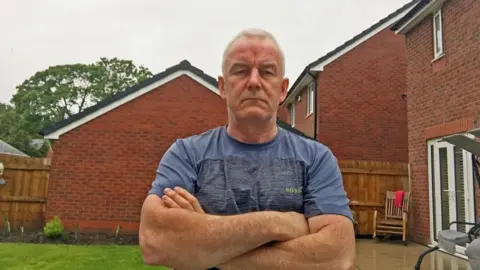'We've been caught in a leasehold trap'
 Ian Rice
Ian RiceWhen Ian Rice bought his new home two years ago, he didn't really think about the leasehold. Now he's angry that he was "mis-sold" an unfair contract.
"We feel we've been caught in a leasehold trap. The developers weren't honest with us. They told us we had to use their solicitors, who didn't warn us about any of the hidden service charges in the lease," he told the BBC.
Ian reckons it will cost him more than £20,000 to get out of the leasehold trap.
But stories like his have prompted the Competition and Markets Authority (CMA) to announce an investigation into the leasehold system.
It said it wants to find out whether people are being treated fairly when buying a home.
Treated unfairly
Ian Rice is convinced he was treated unfairly: "It was a new build and the sales rep said that as the ground rent was just £250 a year there wasn't much point buying the freehold."
But when the Liverpool-based builder decided to add an extension, he got a shock. "We discovered there were all sorts of covenants on the lease contract.
"We would have to pay permission fees to build an extension, or even to just paint our front door."
He is is angry about being mis-sold the lease and the fact that the developers have now sold on the freehold and the new owners have doubled the cost of Ian buying it.
"It's going to cost me more than £20,000 to buy the freehold and pay associated legal costs," he said.
Misleading practices
The CMA has launched its investigation after concerns were raised by MPs and consumer groups about unfair leasehold contracts, with costly fees or onerous terms.
"Our investigation will shed light on potential misleading practices and unfair terms to help better protect people buying a home in future," said George Lusty, senior director for consumer enforcement at the CMA.
The watchdog is writing to developers, lenders and freeholders asking for information about how leaseholds are sold and managed, and the terms their contracts contain.
It also wants to understand the impact such practices have on homeowners, and is calling on people to share experiences that could be relevant to its work by 12 July.

What will the investigation cover?
The CMA's consumer protection law investigation will examine two key areas:
- Potential mis-selling: whether people who have bought a leasehold property are given the information they need to fully understand the obligations they are taking on, for example the requirement to pay ground rent over a certain period of time, or whether they have an accurate understanding of their ability to buy their freehold.
- Potential unfair terms: whether people are having to pay excessive fees due to unfair contract terms. This will include administration, service, and "permission" charges - where homeowners must pay freeholders and managing agents before making home improvements - and ground rents, which in some cases can double every 10 years.

In March, a committee of MPs called for the CMA to probe leasehold mis-selling claims.
The Housing, Communities and Local Government Committee said that the leasehold system has left a number of householders in unsellable and unmortgageable homes.
It said leaseholders in new-build properties are often treated as a source of profit.
"For too long, housebuilders and developers have not been transparent enough about what it actually means to buy a leasehold property, which has led to three in five [people] feeling like they were mis-sold," said Mark Hayward, chief executive of estate agent trade body NAEA Propertymark.
"Buying a property is a huge undertaking and it should be an exciting time, but for thousands of homeowners, it's led to financial difficulty as they've become trapped in confusing contracts with freeholders. It's encouraging to hear the CMA will take enforcement action against any company found to be misleading consumers."
"Leaseholders have been consistently ripped off by freeholders for decades and on a huge scale," said Louie Burns of the Leasehold Group of Companies.
"By employing dishonest practices, including onerous ground rent terms, unjustifiably high service charges and one-off bills, unfair and excessive permission charges, and unreasonable costs to enfranchise or extend leases, freeholders have effectively held leaseholders to ransom.
"This has not happened by accident - it is the result of a concerted effort by greedy freeholders and developers to extract every penny they can from leaseholders, many of whom simply did not understand the implications of leasehold ownership because they were not provided with the correct information at the time of purchase."

The difference between a freeholder and a leaseholder
Someone who owns a property outright, including the land it is built on, is a freeholder.
With a leasehold, the person owns a lease which gives them the right to use the property. But they still have to get their landlord's permission for any work or changes to their homes.
When a leasehold flat or house is first sold, a lease is granted for a fixed period of time, typically between 99 and 125 years, but sometimes up to 999 years - although people may extend their lease or buy the freehold.
But leasehold house owners are often charged expensive ground rent as well as fees if they want to make changes to their homes. A leasehold house can also be difficult to sell.

